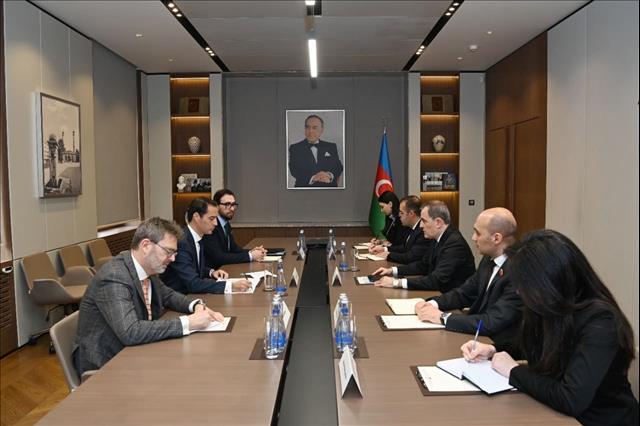(MENAFN- AzerNews)

Sabina Mammadli read more Azerbaijani Foreign Minister Jeyhun Bayramov and NATO
Secretary-General for the Caucasus and Central Asia Javier Colomina
discussed major issues on the current agenda of cooperation between
Azerbaijan and NATO, Azernews reports.
Noting that constant political dialogue between Azerbaijan and
NATO promotes cooperation in various fields, Bayramov stressed that
Azerbaijan's participation in NATO-led peacekeeping operations is
the embodiment of the importance that the country attaches to
cooperation in this area.
Further, the Azerbaijani official informed his interlocutor
about the course of the process of normalization of relations
between Azerbaijan and Armenia, the steps taken by Azerbaijan
towards advancing the peace agenda, the military-political
provocations of Armenia that undermine the peace process, and the
still existing mine threat. Refuting the information about the
alleged `blockade' of the Lachin road and reports about the
`humanitarian crisis', Bayramov stated that the accusations are
groundless and do not reflect reality, and are aimed at hiding the
facts of Armenia's misuse of the Lachin-Khankandi road, which is
intended for humanitarian purposes only.
He then added that despite the unconstructive steps of Armenia,
Azerbaijan is ready to hold the next tals in a short time and is
determined to advance the peace agenda.
In turn, Colomina stressed the importance of mutual visits to
the development of cooperation, noting with satisfaction the
participation of Azerbaijan in peacekeeping operations within NATO.
He stressed that Azerbaijani peacekeepers played an important role
in the evacuation at the Kabul International Airport. The official
expressed satisfaction with the cooperation between Azerbaijan and
NATO in the development of other areas, including energy security,
education, etc.
He also noted that the tension in the region is of concern, and
the importance of continuing the process of normalizing relations
between Azerbaijan and Armenia for the establishment of peace and
security was emphasized.
Relations with NATO started in 1992 when Azerbaijan joined the
North Atlantic Cooperation Council. This forum for dialogue was
succeeded in 1997 by the Euro-Atlantic Partnership Council, which
brings together all allies and partner countries in the
Euro-Atlantic area.
Bilateral cooperation began when Azerbaijan joined the
Partnership for Peace (PfP) program in 1994. Thanks to regular
participation in PfP activities, Azerbaijan has been able to
contribute actively to Euro-Atlantic security by supporting
NATO-led peace-support operations.
Azerbaijan's participation in the PfP Planning and Review
Process (PARP) since 1997 has allowed NATO and individual allies to
assist Azerbaijan in developing selected units to improve
interoperability with those of the allies.
NATO and Azerbaijan started work on a jointly agreed Defense
Education Enhancement Programme (DEEP) in 2008 to integrate NATO
standards into the teaching methodologies and curricula of the
country's Professional Military Education (PME) institutions.
In 2018, Azerbaijan asked NATO to also involve the Military High
School, a pre-commissioning school, in DEEP.
---




















Comments
No comment